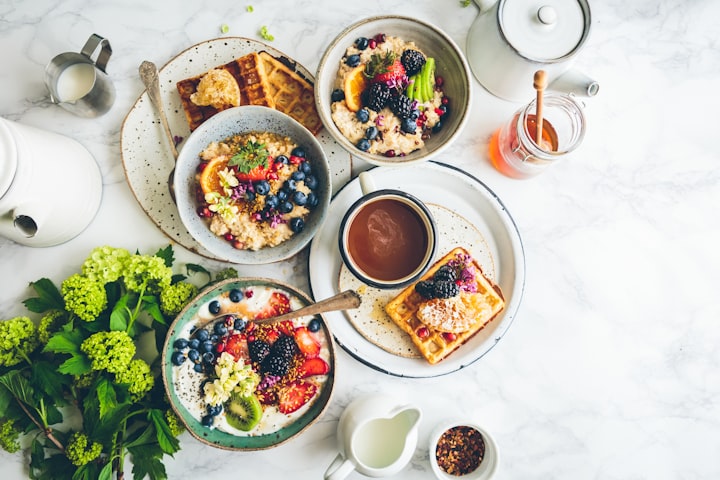Veggies for Breakfast: Why You Should Eat More of Them
Breakfast

For many people, breakfast consists of a bowl of cereal, fruit or even eggs and bacon — but what about veggies? They might be the most important part of your day’s first meal, whether you like it or not. That’s because the vitamins and minerals in veggies provide an energy boost that can keep you going all morning long, and they give you the nutrients you need to keep your mind sharp through the rest of the day. The best part? Veggies are delicious when prepared right — so there’s no reason to eat them any other way!
What are some of the benefits?
Drinking veggies or eating them at breakfast can help start your day off right by giving you more energy and nutrients. If you drink them in a juice, they will also help to detoxify your body as well. Drinking veggies or eating them at breakfast can be very helpful for people who are trying to lose weight because it gives them a healthy way to ensure that they don’t eat too much during lunch, which is when most people tend to overeat. It’s important not to skip meals, so instead of having a smaller breakfast to leave room for an extra-large lunch and dinner, opt instead for more food at your breakfast time.
How do you know what types to pick?
There’s no wrong or right answer here—it all depends on what you like, how much time you have to prepare breakfast, and how many veggies you want in your morning meal. A few things to keep in mind: Steer clear of starchy vegetables like potatoes, corn, and beans; they’re great sources of fibre but too high in calories to eat at breakfast. Leafy greens are also a good option because they provide vitamins and minerals without a lot of calories (the exception is if you like creamy omelettes). Most other vegetables can work as long as you don’t turn them into fried sides or drown them in fat-laden sauces. So choose colourful veggies with healthy nutritional profiles—and add plenty of them to your plate!
What should I avoid when picking out veggies?
When it comes to selecting fresh veggies, you want to avoid picking ones that are wilted, discoloured or bruised. Make sure your fruits and veggies are firm and don’t have any soft spots on them. Over time they’ll go bad, but keeping an eye out can help keep them fresh longer! It’s also best to eat fruit at breakfast and vegetables at dinner—it takes longer for your body to digest fruit than it does vegetables, meaning if you eat fruit with other foods your stomach may not be able to break down all of its nutrients as well.
When should I eat them?
Eating veggies at breakfast is an easy way to incorporate more produce into your day. For example, if you normally have cereal or eggs, sauté some spinach or mushrooms in olive oil, and serve with toast and a slice of cheese. If you’re having a smoothie, add some fresh berries and a handful of spinach to your blender. Looking for something more filling? Mashed cauliflower makes a great stand-in for potatoes in many recipes. And try serving sautéed zucchini with dinner instead of as part of a side dish—the taste is similar to pasta, so even picky eaters might enjoy it! (You can also use spaghetti squash as a substitute.)
What foods pair well with these veggies?
If you’re trying to get more veggies into your diet, it can be a daunting task. Sure, vegetables are delicious on their own—but when cooked as an addition to a savoury dish, they can be downright repulsive. The trick is pairing them with other foods that can stand up to stronger flavours like peppers or garlic. Try swapping out onions and bell peppers in place of higher-calorie meats such as sausage or bacon. Broccoli tastes great with eggs and works well in omelettes; try seasoning it with garlic and olive oil, if desired. For more ideas on how to eat your veggies at breakfast, consult with a registered dietitian near you.
Do I have to cook them?
Eating veggies is more convenient than you might think, especially when eaten at breakfast. Plus, snacking on fresh veggies and fruits will help you with breakfast. In a study published in Appetite, researchers found that participants who ate fruit before eating a meal consumed around 100 fewer calories during their lunch. Overall, making a smoothie with fruit and yogurt was shown to increase satiety by as much as 68 per cent compared to drinking a calorie-matched shake without fruits or vegetables.
What should my diet look like on an average day?
Every diet is different, but here’s a general guideline you can follow for a balanced diet. If you have questions about your specific needs, please consult with your physician or other health care professional. On average, 50% to 60% of your daily calories should come from carbohydrates—which include starchy foods like potatoes and grains as well as fruits and vegetables.
Any recipes for inspiration?
Any time of day is a good time to eat healthily, but if you have any favourite veggie recipes that are suitable for breakfast, include them here. Below is a tasty recipe from the Food Republic. As always, if you don’t have your own recipe or photos to share, feel free to link back to something in your archives.
"Health Products"
About the Creator
Healthy Lifestyle the story
I am content writer for articles. I have also provided need articles everywhere. I like articles writer for time to time services provided also customer.






Comments (1)
Nice